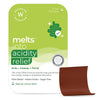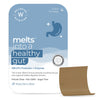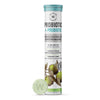Whether it's a cross-country flight, a long road trip, or a weekend getaway, traveling often throws our body's rhythm out of balance. One common and unwelcome companion during these journeys? Acidity While Traveling. If you've ever felt that uncomfortable burning sensation after indulging in a local delicacy or after skipping a meal during a busy travel day, you’re not alone. The good news: With a few thoughtful adjustments, you can travel freely and comfortably without battling indigestion.
In this guide, we’ll unpack how to prevent acidity while travelling, share simple, actionable tips, and recommend ways to keep your digestion on track so you can focus on making memories, not fighting discomfort.
Understanding Travel-Induced Acidity
Acidity, in simple terms, occurs when excess stomach acid backs up into the esophagus, causing discomfort. While occasional acidity can happen to anyone, frequent episodes while traveling can really put a damper on your trip.
Understanding Indigestion while travelling helps you proactively manage it, rather than reacting to it when it strikes.
Why Traveling Triggers Acidity
Several factors make travelers particularly prone to acid reflux and indigestion:
Disrupted Meal Times and Irregular Eating Patterns
When you're in transit, meal timings often take a back seat. Skipping breakfast to catch an early flight or eating late-night dinners after exploring a new city can disturb your digestive clock, increasing the risk of acidity. (NIH)
Consumption of Unfamiliar or Spicy Foods
Exploring local cuisines is half the fun of traveling but unfamiliar ingredients and spice levels can sometimes overwhelm your stomach, leading to indigestion & GERD issues while traveling. (NIH)
Stress and Anxiety Associated with Travel
From airport security lines to navigating unknown roads, travel can be stressful. Studies published in PubMed confirm that psychological stress can worsen gastrointestinal symptoms, including heartburn. (NIH)
Lack of Physical Activity During Journeys
Long hours sitting in cars, buses, or planes slow down digestion, contributing to bloating, discomfort, and acid reflux. A 2024 study reveals that physical activity is associated with a 20% decrease in gastroesophageal reflux disease (GERD). (NIH)
Common Symptoms to Watch For
Recognizing the early signs of acidity can help you manage it before it worsens: (NIH)
-
Heartburn and Chest Discomfort: A burning sensation behind the breastbone, often after meals or at night.
-
Bloating and Gas: Feeling overly full, often accompanied by frequent burping.
-
Nausea or Regurgitation: Experiencing a sour taste or food coming back up into the throat.
-
Sour Taste in the Mouth: A lingering sour or bitter taste, even hours after eating.
-
Disrupted Sleep: Acidity can worsen when lying down, making restful sleep elusive.
If you often encounter these issues, it’s time to rethink your travel habits and pack a little smarter.
Pre-Travel Preparations to Prevent Acidity
Preparation is your best defense against Acidity While Traveling. Here’s how you can stay ahead:
Plan Your Meals Ahead
Where possible, research food options at your destination or during transit. Aim for lighter, less greasy meals, and prioritize foods you know your body tolerates well. Carry familiar snacks like plain nuts, granola bars, or fruit to avoid impulsive, spicy, or heavy meals. (J.H meds)
Pack Essential Items
Beyond your passport and chargers, make room in your bag for digestive essentials. Consider carrying an acidity relief supplement made with natural, clinically backed ingredients. A high-quality supplement that blends soothing herbs can make a world of difference, especially when food choices are limited. Look for clean-label options that are gentle yet effective, like those from trusted wellness brands.
Stay Hydrated
It sounds simple, but dehydration can intensify acidity. Carry a refillable water bottle and sip throughout the day. Avoid overdoing caffeinated or carbonated beverages, as they can aggravate acid reflux. (NIH)
Natural Remedies and Smart Supplements for Acidity Relief on the Go
Even with mindful planning, acidity can sneak up on you, especially while traveling. The good news? Natural remedies and thoughtfully formulated supplements can offer gentle, effective relief. Here are some tried-and-true ingredients and smart supplement options to help keep your digestion on track.
Natural Herbs That Help
-
Amla (Indian Gooseberry): Rich in Vitamin C and antioxidants, Amla helps neutralize excess stomach acid and soothes the digestive tract.
-
Caraway Seeds: Known for easing bloating and gas, caraway seeds support smoother digestion and prevent acid buildup.
-
Fennel: These seeds relax digestive muscles, reduce acidity, and relieve discomfort from gas and bloating.
-
Mint: Naturally cooling and calming, mint can help ease indigestion and offer quick relief from heartburn.
-
Anise (Saunf): This fragrant seed promotes healthy digestion and helps naturally neutralize stomach acid.
Smart Supplement Tip:
For convenient relief on the go, consider Wellbeing Nutrition’s Acidity Relief Melts, a fast-dissolving, plant-based oral strip formulated with Amla, Caraway, Fennel, Mint, and Anise. Backed by clinical research, it offers quick, water-free relief wherever your journey takes you.
Probiotics for a Balanced Gut
A healthy gut microbiome is key to preventing acidity, especially when you're on the move. Probiotics, whether from food or supplements, can ease bloating, support digestion, and promote gut harmony.
Smart Supplement Tip:
Wellbeing Nutrition’s Healthy Gut Melts combine gut-friendly probiotic strains with digestive enzymes in a travel-friendly format, ideal for daily digestive support, even while traveling.
Apple Cider Vinegar for Digestive Balance
Apple cider vinegar (ACV) helps balance stomach pH and supports smoother digestion when taken before meals.
Smart Supplement Tip:
Skip the harsh taste with Wellbeing Nutrition’s Apple Cider Vinegar Effervescent Tablets, infused with Garcinia Cambogia and Pomegranate for added digestive and detox support. A refreshing and portable gut health solution for life on the go.
Conclusion
Travel is meant to be joyful and nourishing for the soul, not interrupted by heartburn, bloating, or digestive discomfort. The key to preventing acidity while traveling lies in a little preparation, thoughtful food choices, and the right support from nature-backed solutions.
By understanding what triggers acidity and taking proactive steps like packing clean supplements, choosing familiar meals, and staying hydrated, you give your body the comfort it needs to keep up with your adventures.
Here’s a quick recap for a comfortable journey
• Eat regular, balanced meals even on the go
• Opt for familiar, light foods that support digestion
• Stay hydrated throughout the day
• Move your body whenever possible
• Carry gentle and effective supplements that support gut health naturally
With a little planning and the right tools in your bag, you can travel with ease, protect your gut, and focus fully on the joy of exploring new places.
FAQ -
1.What causes acidity while traveling?
Acidity while traveling is often triggered by irregular meal timings, stress, lack of movement, and consuming unfamiliar or spicy foods. These factors can disrupt digestion and lead to acid buildup.
2.How can I avoid acidity while eating outside during trips?
Choose lighter, less greasy meals and avoid overly spicy or unfamiliar dishes. Carry familiar snacks, stay hydrated, and consider adding a natural digestive supplement to your travel kit.
3.Are there any natural remedies to prevent indigestion while traveling?
Yes, natural ingredients like Amla, Caraway, Fennel, Mint, and Anise help soothe the digestive system. Supplements like Wellbeing Nutrition’s Acidity Relief Melts are travel-friendly and offer quick relief.
4.What foods should I avoid to prevent acidity while on vacation?
Limit spicy, greasy, and heavy foods, especially late at night. Opt for lighter meals, avoid excessive caffeine or carbonated drinks, and eat at regular intervals to support digestion.






























 DOWNLOAD NOW
DOWNLOAD NOW
